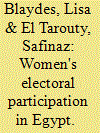| Srl | Item |
| 1 |
ID:
099369


|
|
|
|
|
| Publication |
2010.
|
| Summary/Abstract |
Most of the reports about the reaction of the Ethiopian regime to the blow that it suffered in the 2005 elections focus on its institutional evolution, and conclude that it took a turn towards even stronger authoritarianism. Observations made in a rural community in south-east Amhara State reveal that it reacted first, until the end of 2009, by a whole range of the deepest reforms since its takeover in 1991. These combined a stronger grip of the ruling party in all areas with a 'liberalisation' of the rural development strategy and first steps towards local 'good governance'. They were embodied in the rise of the traditional rural elite which had been ostracised for years, as if the regime was trying to build its new constituency on it. But at the end of 2009 the local authorities suddenly returned to the all-encompassing authoritarian attitude characteristic of the pre-2005 period. This 'liberalisation' could thus be seen as merely a tactical interlude, conceded by a ruling party still driven by its Leninist legacy and the Abyssinian 'culture of power'.
|
|
|
|
|
|
|
|
|
|
|
|
|
|
|
|
| 2 |
ID:
090312


|
|
|
|
|
| Publication |
2009.
|
| Summary/Abstract |
In 2005, Ellen Johnson Sirleaf defeated George Weah to become President of Liberia and the first woman elected to head an African country. Women voters were widely credited with her victory. This paper quantifies this claim by analysing newspaper content during the election period to gauge civil society group activity. It finds that consistency in their activities may have allowed women's groups to surpass other civil society groups in impacting the election. Activity levels of women's groups remained stable between the election and run-off periods, unlike other major group types whose activity level dropped by between 37% and 70%. It concludes that the environment surrounding the 2005 election was conducive to participation by women because of their existing, latent power in many spheres; their long experience as peacebuilders; the decimation of conventional social and political structures; Liberian women's experience in leadership positions; the failure of multiple male-dominated efforts; and the presence of a well-qualified female candidate.
|
|
|
|
|
|
|
|
|
|
|
|
|
|
|
|
| 3 |
ID:
089638


|
|
|
|
|
| Publication |
2009.
|
| Summary/Abstract |
To what extent do gender considerations impact voter recruitment strategies in Middle Eastern elections? Based on an examination of voting behavior in Egypt, we find that clientelist voter recruitment tends to empower women economically rather than politically as elections provide an opportunity for disadvantaged women to sell their vote to local vote brokers or offer their vote to a local patron in exchange for a future payoff. In contrast, women who vote for Islamist candidates may be able to increase the influence of their political support by creating common knowledge about the popularity of their candidate and by reducing the effectiveness of government repression.
|
|
|
|
|
|
|
|
|
|
|
|
|
|
|
|